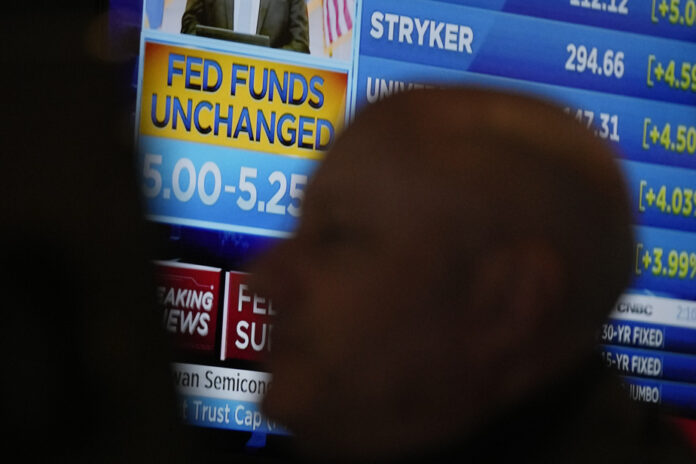(Paris) The European and American stock markets welcomed on Thursday without joy the scenario evoked by the American central bank of two additional rate hikes and are cautious before the meeting of the European Central Bank (ECB).
In Europe, around 6:45 a.m. (Eastern time), Paris lost 0.78%, Frankfurt 0.64% and Milan 0.46%. London grabbed 0.02%.
Wall Street futures are pointing to an opening in the red as well.
The US Federal Reserve (Fed) has decided not to raise its key rates, for the first time since March 2022 and after ten consecutive increases, and is giving itself a little more time to observe the evolution of the economy.
But given inflation still high – 4% in May in the United States – Fed Chairman Jerome Powell warned that almost all members of the institution were in favor of a further rate hike.
Fed rate forecasts from individual members suggest “two more rate hikes, which comes as a surprise” more restrictive than expected by investors, said Vincent Juvyns, strategist at JP Morgan AM.
For CMC Markets analyst Michael Hewson, Jerome Powell’s tone was intended to “shape market expectations.” The analyst sees no real justification in the economic data for two more rate hikes.
Investors’ attention is now turning to the European Central Bank which meets this Thursday.
A 0.25 point increase in ECB rates is expected.
The institution’s president, Christine Lagarde, will probably opt for a strict tone and reaffirm “that despite the recent easing of inflationary pressures – and perhaps the deterioration of the economic outlook – the ECB will continue its efforts to combat inflation,” predicts Swissquote Bank analyst Ipek Ozkardeskaya.
Natixis CIB Research analysts will be “particularly attentive to the publication of the new projections and to the comments on inflation which has fallen lately”.
On the bond market, sovereign interest rates rose, particularly European short-term rates, which are the most sensitive to monetary policy expectations. The yield on German two-year debt was worth 3.08%, down from 3% at Wednesday’s close and the US equivalent 4.74%, down from 4.69% on Wednesday.
The risk of raising rates is to threaten growth. Germany, Europe’s largest economy, will post a recession in 2023, weighed down by inflation which is undermining consumption, according to forecasts from two institutes.
In China, stock markets were galvanized by the announcement of a benchmark interest rate cut by the Chinese central bank, a measure intended to support the economy, which overshadowed disappointing economic indicators.
Hong Kong climbed 2.17% and Shanghai rose 0.74%.
The action of the online clothing retailer Asos soared 15% in London after a return to profitability in the third quarter of its staggered 2022/2023 financial year, despite a decline in sales.
Swiss textile group Calida fell 3.44% after issuing a 2023 earnings warning amid a “difficult” consumer climate affecting its recent acquisitions, in particular German start-up Erlich Textil from which it will divest .
Natural gas prices were climbing, driven since early June by the drop in supplies from Norway, due to leaks and maintenance at many facilities.
Around 6:40 a.m. (Eastern time), the Dutch TTF, the benchmark European contract, climbed more than 20% to 46 euros per megawatt hour (MWh), shortly after reaching 47.64 euros per MWh, a plus high price since early April.
Oil prices rebound Thursday. The barrel of Brent for delivery in August advanced by 0.97% to 73.91 dollars and that of American WTI, with maturity in July, by 0.85% to 68.85 dollars.
The euro rose 0.13% to $1.0844.
Bitcoin lost 0.24% to $24,870.















